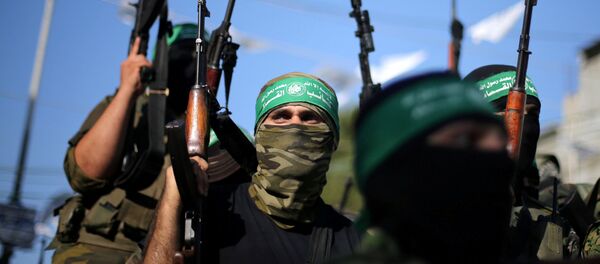"I don't think that Haley was listening closely to the discussion of all other members of the UNSC. I do not think there will be a resolution. Her proposal will not get the support from anyone and it is only her ideas," Mansour said.
The ambassador noted that the proposed resolution could escalate tensions between Hamas and the Palestine Liberation Organization (PLO) if passed, while the majority of the UN Security Council members would prefer the two political movements to overcome differences.
"UNSC members are having an opinion that the sides need to 'put the house in order' meaning the unity between the PLO and Hamas, including the ambassador of the United Kingdom, who is the closest to the Americans, so no one in the UNSC is interested in deepening the division between Hamas and the PLO," he said.
In June 2014, Hamas, which had de-facto control over the Gaza Strip, formed a unity government with the more moderate West Bank-based Palestinian Fatah party, the largest faction of the PLO, recognized by a wide majority of UN member states as the only legitimate representative of the Palestinian people.
The Palestinian unity government under President Mahmoud Abbas was largely believed to be Fatah-loyal and resigned in 2015 upon Hamas' protest. Then, the cabinet was reshuffled twice by Abbas, with Hamas forming a separate government in the Gaza Strip again in 2016. Thus, repeated attempts made by regional forces to achieve reconciliation between the two parties has so far failed.
Palestinians seek diplomatic recognition for their independent state on the territories of the West Bank, including East Jerusalem, which is partially occupied by Israel, and the Gaza Strip. Israel has been building settlements on the occupied territories despite objection from the United Nations.
The United States should contribute to the common efforts within the United Nation Security Council (UNSC), aimed at helping to resolve the Israeli-Palestinian conflict instead of taking unilateral steps in its mediation, Riyad Mansour.
"The UNSC has a role to play at maintaining international peace and security and has a role to play with regard to Palestine's question. The United States, including Ambassador [to the UN Nikki] Haley, does not want it to play an active role. They want to deal with the crisis alone, to see if they can deal through the bilateral talks with two parties — Palestine and Israel," Mansour said.
Last month, US President Donald Trump visited Israel as part of his first overseas trip abroad as the head of state in a bid to promote peace between Israelis and Palestinians and to contribute to agreements between the two sides.
In order to reaffirm the White House’s commitment to the goal of a lasting peace deal between the Israelis and Palestinians, on June 21, Jared Kushner, Trump’s son-in-law and adviser, and Special Representative for International Negotiations Jason Greenblatt met Israeli Prime Minister Benjamin Netanyahu and Palestinian Authority President Mahmoud Abbas during a trip to Jerusalem and Ramallah.
Tensions between Israel and Palestine have continued to escalate throughout the years. Palestinians seek the creation of an independent state in the West Bank and Israel's withdrawal from the Palestinian territories it occupied after the Six-Day War in 1967.
Palestine does not expect any real progress in the Israeli-Palestinian peace process to be made at the UN Security Council (UNSC) debates scheduled for July 25, Palestinian UN envoy said.
"On 25 of July there will be an open debate on the situation in the Middle East, including the Palestinian question related to the status of the political process, what is the situation on the ground. I don't expect any motion to be tabled during that debate. Many countries will talk about the implementation by Israel of UNSC Resolution 2334, which was adopted last December," Mansour said.
The ambassador reiterated that according to UN Special Coordinator for the Middle East Peace Process Nickolay Mladenov's report, released earlier in June, Israel has failed to comply with the UNSC Resolution 2334, which strongly criticized its illegal settlements’ policy and instead accelerated such activity.
"The countries will be asking for [the resolution's] implementation and for halting Israel’s settlement activities. The United States is most likely to talk about other subjects because they do want to bring up the question of Palestine, so we do not expect any product to come out from that debates in the coming months," he said.
The ambassador sees China's upcoming July presidency at the UNSC in a positive light.
"China is a good and close friend of Palestine, and we look forward to its presidency in the UNSC," he said.
On December 23, 2016, the UN Security Council adopted Resolution 2334, according to which Israel must cease all settlement activities in the West Bank and East Jerusalem as violating international law. However, Israel continued authorizing the construction of further settlements. On February 6, Israel’s parliament passed a law legalizing almost 4,000 Israeli housing units to be built on privately owned Palestinian land.



